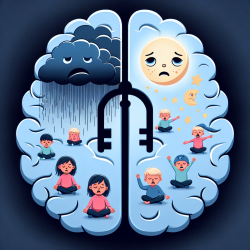The COVID-19 pandemic has had a profound impact on mental health worldwide, but its effects on specific populations, such as youth with neuroinflammatory disorders, are particularly noteworthy. A recent study titled "Pandemic-associated mental health changes in youth with neuroinflammatory disorders" sheds light on how these changes manifest and what practitioners can do to improve their practice.
The Study: Key Findings
This research explored how the COVID-19 lockdown affected sleep, anxiety, depression, and physical activity among children with neuroinflammatory disorders. The study involved 314 participants who completed 821 responses through questionnaires assessing various mental health parameters.
- Increased Sleep: The study found a significant increase in nighttime sleep during the first six months of the lockdown. Teenagers reported a more substantial increase compared to preteens.
- Anxiety and Depression: Overall anxiety and depression levels did not show significant changes; however, teenagers experienced a decrease in anxiety post-lockdown compared to preteens.
- Physical Activity: There was no significant change in physical activity levels pre- and post-lockdown. However, higher anxiety was noted among inactive individuals.
Implications for Practitioners
The findings of this study offer valuable insights for practitioners working with youth who have neuroinflammatory disorders. Here are some actionable strategies:
- Emphasize Sleep Hygiene: Encourage better sleep practices as increased sleep was one of the positive outcomes noted during the lockdown. Consider integrating sleep assessments into regular therapy sessions to monitor improvements or declines.
- Focus on Age-Specific Interventions: Tailor interventions based on age. Teenagers may benefit from strategies that leverage their increased independence and technological connectivity, while preteens may need more support in managing anxiety exacerbated by social disruptions.
- Promote Physical Activity: Given the association between inactivity and higher anxiety levels, encourage physical activities that can be done safely at home or outdoors while maintaining social distancing.
Encouraging Further Research
This study highlights the need for ongoing research into the mental health impacts of pandemics on vulnerable populations. Practitioners are encouraged to stay informed about emerging studies and consider participating in research initiatives that aim to develop effective interventions for youth with neuroinflammatory disorders.
To read the original research paper, please follow this link: Pandemic-associated mental health changes in youth with neuroinflammatory disorders.










